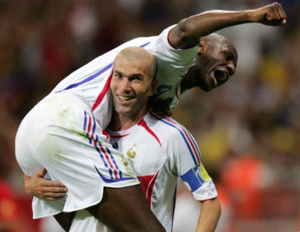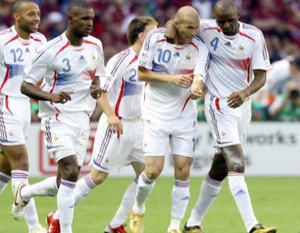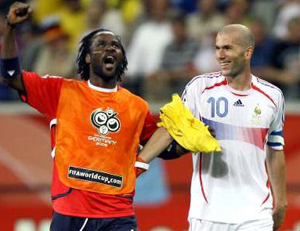The “beautiful game” bade him a cruel farewell, much of polite society denounced him, and the FIFA president threatened to take back his Golden Ball award. But some things just don’t change. An adoring crowd in Paris gave the Les Bleus a heroes’ welcome and Zizou the farewell he deserved. The French President could have as well spoken for all football neutrals when he said: “[Dear Zinedine Zidane] You are a virtuoso, a genius of world football. You are also a man of the heart, of commitment, of conviction, and that’s why France admires and loves you.”
However, there is no end in sight to the hand-wringing about Zizou’s headbutt. “What should we tell our children and all those for whom you have become an example for ever”, inquired L’Equipe‘s editorial, the Daily Mirror condemned it as “one of the worst crimes a footballer has ever committed,” and Le Parisien prophesied that “the blue angel [had] turned into a devil.” When the public reception in Paris and opinion polls showed no fall in Zizou’s iconic status, the corporate media’s bewilderment spilled over into headlines such as Zidane still worshipped by majority in France and Zidane still hero to Chirac and other fans. Who said Materazzi only sold it well to the referees? The press seems to have bought it as well!1
Zizou’s condemnations have mostly been categorical, something on the lines of “Nothing Materazzi did could justify Zizou’s reaction.” As one columnist wrote: “Trash talk is the lingua franca of sports. Athletes have to let it go in one ear and out the other, or they would be baited into conduct destructive to themselves and their teams. Black players throughout Europe listen to ugly racist taunts without resorting to cheap shots.”
Hmm. So, it’s Okay for trash talk to be the lingua franca of sports, but the response ought to conform to officially sanctioned modes — studied equanimity (so that the game can go on) or “dignified silence” (so that nothing needs to be done). And black players who don’t retaliate to racist taunts are to be the touchstone for on-field player behavior!
After a few days of silence, Zizou finally gave his side of the story on television. While clearing Materazzi of the “terrorist” slur,2 Zizou accused him of repeatedly using “hard words” — “words that touch the innermost parts of me. Very personal things, my mother, my sister.” He repeatedly apologized to children who had caught the incident on television and to “the people in education whose job it is to show children what they should and shouldn’t do.” And here’s the best part that some moralizers have already pounced upon:
I can’t regret [the incident] because if I do it would be like admitting that he was right to say all that. And above all, it was not right. We always talk about the reaction, and inevitably it must be punished. But if there is no provocation, there is no reaction. First of all you have to say there is provocation, and the guilty one is the one who does the provoking. The response is to always punish the reaction, but if I react, something has happened.”
Given his rather privileged position, perhaps Zizou could have cultivated some thick-skinnedness, but he’s after all human. Besides, his mother had been hospitalized on the day of the final, so Materazzi’s abuse must have been particularly painful. On his part, Materazzi has admitted provoking Zizou, though he sought to downplay it as “one of those insults you’re told dozens of times and that you let fall on a pitch.” Considering Materazzi’s repeated insults, Zizou’s reaction is perfectly understandable and was more of a tactical blunder — since “violent conduct” is a “sending-off offence” — than a grievous breach of sportsmanship. However, Materazzi is also guilty of a “sending-off offence” — use of “offensive or insulting or abusive language and/or gestures.” There’s no point hypothesizing whether the result would have been any different had Materazzi (or, both Zizou and Materazzi) been sent off. Italy surely had the firepower to play 10-on-11 for the last ten minutes and still win the match, but given what transpired, its victory does ring hollow3.

|
Meanwhile, opinion on Zizou continues to be divided. Throughout his playing career, he and the Les Bleus (that he came to personify after the 1998 World Cup Final) have meant many things to many people. For the racial minorities, they perhaps provided a temporary escape and a hope to cling on to amidst the reality of everyday racism. In the words of a Cameroonian immigrant in France: “The French team reflects the cultural diversity of France. There’s nothing like it in the social, political or business fields. This is why I love the French team.”4 In contrast, French xenophobe Le Pen complained that “the French don’t feel totally represented” due to the high “proportion of colored players.” Similar sentiments were also echoed by a former Italian minister (Roberto Calderoli), who rejoiced at the defeat of a team comprised of “Negroes, Communists and Moslems.”
Adulation from ethnic minorities in France and vituperation by racists has led some to glorify the Les Bleus and invest them with a social import far removed from reality. Dave Zirin, for instance, writes: “Whether or not they defeat Italy for the title, the astonishing success of France’s multi-ethnic team presents another vision for the future of the continent.” Unfortunately, such optimism is merely wishful thinking. For that matter, the Les Bleus’ 1998 victory, when the team’s multiethnic composition caused it to be dubbed as “blanc, black, beur” (white, black, Arab”), was supposed to herald an era of social healing, but in the eight years since then, France (along with much of Europe) has only become less welcoming of immigrants and French ethnic minorities. As Kader, an unemployed 25-year-old opined: “[The French ethnic majority] only love us when we score goals. The rest of the time they are afraid of us.”5
Similarly, Zizou’s head-butt was initially applauded as an anti-racist act, a “political statement directed to all of us” in the context of the “war on terror.” This claim does have some merit for Zizou has in the past participated in anti-racist initiatives. Before the 2002 Presidential elections, the Les Bleus called for a vote against Le Pen. A press release they issued read: “The players in the French team, from diverse origins . . . are unanimous in condemning resurgent ideas of racism and exclusion” and condemned “attitudes that endanger democracy and freedom as intolerable and indefensible, particularly in a multi-ethnic and multi-cultural France.” And before the final, as captain of the Les Bleus, Zizou released an anti-racist statement in support of the Football Against Racism in Europe (FARE) that read: “There is no place for racism. It is impossible to love this sport, to play it or to support a team, and be racist or xenophobic at the same time.” However, his anti-racism has so far been confined to abstract declarations (except in the case of Le Pen) and repeated affirmations of pride in his Algerian heritage6. For all the love that the minorities have bestowed on him — “Zizou, more than ever, remains one of us,” as one of them affirmed after the final — he owes them more than just a vicarious participation in his successes. Just as they unreservedly embraced him, he ought to embrace their cause7. Until then, Zizou, Merci for enriching the beautiful game. Adieu.
Notes
1 Or, is this (exaggerated posturing) a case of the pundits of the corporate media reaffirming — perhaps to themselves as much as to others — their humanity and sense of right and wrong? In case you aren’t up-to-date, no, Zizou didn’t have horns on his head, and Materazzi is not recovering from a multiple rib fracture. He played on to complete the match and looked to be in good spirits (perhaps lifted by his successful baiting).
2 The Guardian article is the only one to explicitly mention that Zizou denied the terrorist slur; the exact nature of Materazzi’s insult is still unclear. If the abuse was racist, Zizou’s reaction is not just acceptable but laudable.
3 More shameful was the spray painting of Swastikas in Rome’s ancient Jewish ghetto. For more on racism in Italian soccer, see “Mussolini’s Team,” “Footballer’s ‘Fascist Salute’ Row,” “Fans’ Racism Returns to Taint Games in Italy and Spain,” and “Why Today I Wear My Zidane Jersey.”
4 The 17 players from ethnic minorities in the Les Bleus outnumber the number of minorities in the French Parliament — 11 out of a total of 577.
5 While ethnic minorities in the Les Bleus have embraced their French nationality and are looked upon as model citizens, “a minority presence among the ruling political and economic classes is conspicuously absent . . . police harassment is often practiced with impunity and . . . discrimination in employment and housing is a daily reality for those French deemed to be of immigrant background” (qtd. in Graham Murray, “France: the Riots and the Republic,” Race & Class 47.4, 2006, p.31).
6 Indeed, as his teammate Lilian Thuram observed: “When you are rich and famous, people tend not to see your colour.” Zizou can continue to be pleased that his Algerian roots are not being ignored, but this doesn’t amount to much; his Algerian descent doesn’t translate to greater acceptability of Algerians (or African immigrants) in French society. As Robert Fisk observed, the riots of last fall could be traced to the unhealed wounds of the Algerian war of independence and were concentrated in “areas where lower middle-class French people who were pieds-noirs [from Algeria] now live.” Far from acknowledging its hoary past, last November the French state sought to sanitize it by requiring school syllabuses to “recognise, in particular, the positive role of the French presence overseas, notably in North Africa” [qtd. in Murray, op. cit., p.35).
7 Much has been made of Les Bleus striker Thierry Henry “goading” Nike to issue anti-racist wristbands, the proceeds of which are to support Nike’s “Stand Up Speak Up” campaign against racism. For anyone who is aware of Nike’s sweatshop practices in the majority world (see CorpWatch), the PR-value of such an initiative to Nike should be obvious! Thankfully, some anti-racist groups in Spain and Italy haven’t fallen for the bait and refused to take money from Nike. Also, as has been rightly noted, it is “easy for everyone to support a campaign against racism in football when it is targeted against pathologically aggressive, neo-Nazi thugs. It might prove a little more tricky to generate football-wide support if we were to start asking questions about the attitudes in the boardroom, on the pitch, and in the training ground.” Fighting racism in the larger society is, of course, an entirely different ball game.
Ra Ravishankar is a contributor to the Campaign to Stop Funding Hate.


